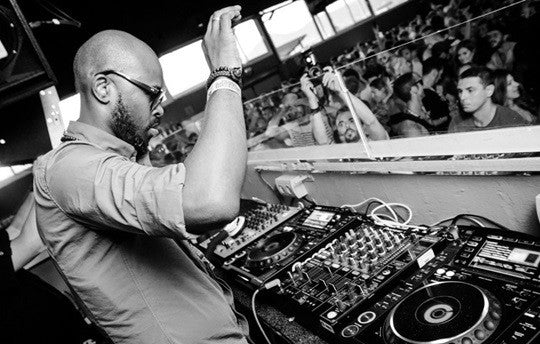Your Cart is Empty

Democratic South Africa is 20 years old. There are 11 official languages, a vast array of cultures and traditions and… the biggest market of electronic house music in the world! As a result, a diverse and talented pool of electronic artists has developed in the 20 years since the dawn of democracy. It is the music of everyday- in the taxi buses, the shops, cafes, townships, and of course on the dancefloor. The recent release of the documentary ‘Future Sound of Mzansi’ brought a reminder of the innovative practices in the contemporary South African music scene, with a focus on electronic music and the future of popular music. Directed by Lebogang Rasetheba and Nthato Mokgata (aka Spoek Mathambo), the film has been screened across the world.
‘South Africa is bursting at the seams with youth, energy, potential and talent,’ says Spoek Mathambo and this is backed up by the animated and passionate emerging artists on the electronic music scene. From ‘Township Tech’ DJs (A phrase coined by Mathambo) across the country, to the world renowned House music of Black coffee and everything in between, there is incredible diversity in this vibrant scene befitting of South Africa.
Electronic music has been burgeoning since the 1990s, with Kwaito the music of the young South Africa, expressing its intial post-apartheid freedom. With the development and availability of music technology over the last decade, coinciding with the arrival and boom of social media the current South African electronic music scene is at the pinnacle of innovation and is a country-wide phenomenom.
Mathambo’s own musical output is a reflection of this. Having released his own solo albums, Mshini Wam, and Father Creeper, his style has been about forging innovation in South African music, mixing his own brand of Hip-hop and electronica with a strong South African identity. His latest project Fantasma is a four-piece group of South Africans from diverse musical backgrounds, featuring DJ Spoko on electronics, André Geldenhuys on guitars and Bhekisenzo Cele on bass. They blend Mathambo’s sound with maskanda infused bass lines, psychedelic electric guitar and Dj Spoko’s ‘Bacardi House’ to create a concoction of energetic artistry
Johannesburg’s House music scene is alive with a vibrant new generation of DJs at the helm. Downtown Joburg is steadily developing into a scene of rooftop parties and clubs where these electronic musicians ply their trade.
Black Coffee is one of South Africa’s most prominent DJs on the global scene, achieving success beyond the borders of South Africa. DJ Spoko has crafted his own brand of ‘Bacardi House’ through his innovative use of music programmes like Fruity Loops. There is a whole host of DJs across South Africa, all making use of the availability of equipment and downloadable software, which was never there before. Black Motion for example continue to make their music in their homes in Soweto. This is backed up by a strong collaborative spirit amongst the scene. DJ Mujava’s ‘Township Funk’ was produced with assistance from DJ Spoko and was one of the most popular tracks of the noughties in South Africa. DJ Zinhle, known as ‘The Queen of House’ has even set up her own DJ Academy for girls, to educate talented youngsters with the skills to flourish as part of South Africa’s future music scene.
Go further north from Johannesburg and you’ll be in Limpopo where Shangaan electro, or makwaya, rules the airwaves. Nozinja is the kingpin in this scene. A former Mobile phone magnate, he turned his business acumen to this emerging music scene, became a producer, marketing manager and label owner and released a series of ultra-fast tempo tracks accompanied with some prodigious dancing prowess.
John Wizards occupy a space of their own, with their fresh brew of a diverse assortment of South African styles, resplendent with jangling guitars and synth driven electronica. Forming in Cape Town, they blend melodies and guitar picking techniques with synthesized kwela sounds and chord progressions reminiscent of mbaqanga and maskanda of the 60s and 70s. While this isn’t along the same lines as a lot of the House music being produced in South Africa, it is still a music rooted in dancing, with the majority of their debut album being instrumental.
There is a long regimen of popular music in South Africa which is seen to have traditional influences: maskanda, marabi, isicathamiya, mbaqanga and kwela to name just a few. And while these aren’t being forgetton, the born-free generation are surging forward with their own voice, their own style, their own reflection of contemporary South Africa. The impact of South African House and electronic music cannot be underestimated as DJs take to playing it on dancefloors not just in the country of its origin, but all over the world. South Africans of all ages who are engaging with the electronic music scene and the technology that goes with it are claiming back their autonomy. The ‘township tech’ generation control their music; they write, record and produce. The energy, mentality and pure love of music permeating through this emerging generation of electronic artists makes the genre a unifying force in South Africa. There is a wealth of different electronic music to be explored for those who want to find it, all over South Africa.
Spoek Mathamabo sums it up: ‘The groove is thick and infectious and we give ourselves to it.’
.